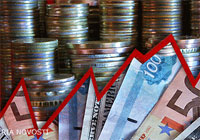Interfax: Russian Investigations Committee drafts measures to slow down capital flight

(Interfax – November 24, 2014) Russian Investigations Committee has prepared its own proposals allowing to “considerably slow down” the capital flight from Russia, the committee’s head Aleksandr Bastrykin has said, as reported by privately-owned news agency Interfax on 24 November.
“We are so wealthy and powerful that we will be able to cope with problems caused by sanctions that are being imposed on us. At the same time, however, if all assets received from privatization and profits received from production were invested in Russia, we would not see poverty and scenes of dilapidation in few kilometres from Moscow. Therefore, the Investigations Committee has proposed a number of amendments aimed to considerably slow down the capital flight from Russia,” Bastrykin said.
Western sanctions against Russia were imposed not only for political but also for economic reasons, Bastrykin went on to say. “They were also provoked by the fact that our Western partners are already afraid of our capital,” he said. Bastrykin cited Germany as an example, saying that the country’s criminal police are allegedly concerned that Russian businessmen will start investing money in German companies and gradually take them under their control.
Bastrykin also spoke about control over privatization in Russia. According to him, the Russian authorities would not allow privatization according to the laws that were used in the 1990s. He said, as quoted in an earlier Interfax report: “If we had personal vouchers, we would, for example, come to Bashneft, against which a criminal case has been launched, and ask for our profits.”
“We cannot allow another privatization in the same form, according to same laws,” Bastrykin added. Russian law-enforcement agencies should exercise a tougher control over the process of privatization, Bastrykin went on to say: “We suggest tougher state control over this process, for which liberal economists are harshly criticizing us today.”
